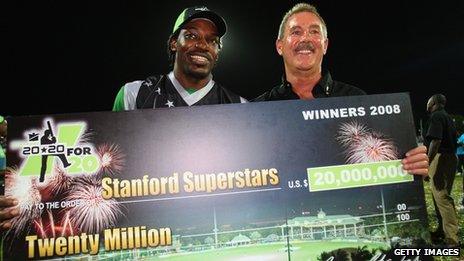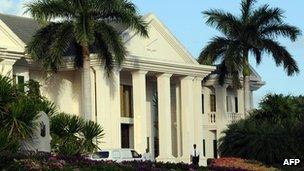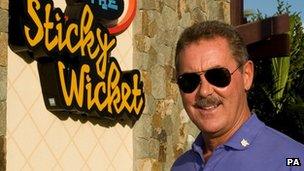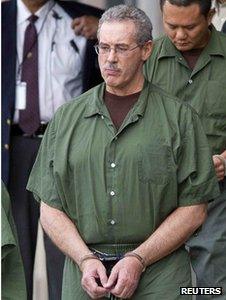Allen Stanford: Antigua feels the fallout of Ponzi case
- Published

Stanford organised money-spinning Twenty20 cricket tournaments in the Caribbean
The trial of Allen Stanford has finally ended, with the Texan financier found guilty of a massive $7bn (£4.5bn) Ponzi scheme by a court in Houston.
The fraud was run from his offshore bank in Antigua and investors' money was used to pay for his lavish billionaire's lifestyle. Customers who lost money from across the globe are suing the Caribbean nation but many there think that they too were victims.
From the moment you arrive in Antigua, Stanford's presence still looms large.
He redeveloped the land around the main airport, so directly opposite arrivals is the Stanford Cricket Ground, and across the road stand the buildings of Stanford International Bank and his former newspaper the Antigua Sun.
It was an image that wooed many of his high-value clients to invest in his companies.
Crumbling empire
Stanford was widely respected until his arrest on suspicion of fraud back in February 2009.

He built the headquarters of the Stanford International Bank in Antigua
He was the island's largest private employer, but when he was charged his empire crumbled.
He paid first-world wages, and when his staff lost their jobs it had a knock-on effect. They in turn fired their helpers, gardeners, nannies; thousands of people were left out of work in a population of just 85,000.
"It's been difficult for many of us. We were getting good money so we spent a bit more on a better house, a new car, and before you know it you're struggling to pay the mortgage, to repay the car loan," says Tim Payne looking through the latest edition of his paper, the Antigua & Barbuda News Pages.
He was the managing editor of the Stanford-owned Sun Newspaper, but started his own publication after the company folded.
"It's amazing that nobody has gone off the deep end," he says.
Political connections
But for many there has been no work since. Some have had to migrate to the US or Canada to find jobs.

Stanford was the man behind the Sticky Wicket restaurant and bar
Stanford's arrest came at a bad time for Antigua. As the world went into an economic crisis, the island had to face this internal shock.
The country is the most tourism-dependent nation in the Caribbean, with more than 70% of economic activity coming from this source.
Mikeda Mikael runs a company that caters for the private jets that fly into this billionaire's playground.
"I handled four or five of his planes once, bringing in senators, congressmen and bigwigs," she says.
"They were partying on yachts in an exclusive resort, and when you have US politicians supporting a man like Mr Stanford on an island as small as Antigua of only 108 square miles, if you had any doubts before they go out the window. America has sanctioned him, he's good to go."
She claims that despite having reservations, many people did business with Stanford because of his US government connections.
Investment welcomed
Stanford first came to Antigua in the 1980s after the authorities closed down his offshore bank in the British overseas territory of Montserrat.
He was welcomed by the Antiguans, who were in dire need of foreign direct investment.
Stanford lent millions to the government. He also built new offices for the administration and even paid for a new hospital. Some say he was buying favour.
"I can't see how anyone would want to blame the Antiguan government... the US government couldn't prove he was running a Ponzi scheme, then how would they expect our regulators with less experience, less resources would be in a position to do something?" asks Gaston Browne, deputy leader and chairman of the Antigua Labour Party (ALP).
Now in opposition, the ALP was in government during most of the time Stanford was based here.
Dealing with the fallout is the job of the current United Progressive Party (UPP) administration.
'Dead broke'

Despite his arrest, many people in Antigua remember Stanford fondly
Investors abroad have started legal action against Antigua and Barbuda. They want $24bn (£15bn) in damages.
The Stanford Victims Coalition is also trying to get the International Monetary Fund to block loans to the country while the case is being fought.
"They have begun legal action in the United States against the government. It is costing us quite a bit to defend the matter, but defend we will," says Attorney General Justin Simon.
"Looking at what is left here and the money owed to these investors and creditors, the value of the assets really don't come up to that much."
In the twin islands, most people still feel that Stanford did a lot of good. I asked a group of men playing dominoes in the capital St John's about him.
"He loved black people and he loved Antiguans, that's why he settled here. It was making headway. And without him the country just dropped automatically. In fact it's broke, dead broke," says one.
"He did good for the country but he made a mistake in his life," another man says.
Antigua's financial reputation has been clearly damaged by Stanford's fraud. The former head of the country's Financial Services Regulatory body is fighting extradition to the US.
It is expected he would face charges related to the Stanford fraud, while its people wait to see if they will pay a heavier price in the future.
- Published14 June 2012
- Published6 March 2012